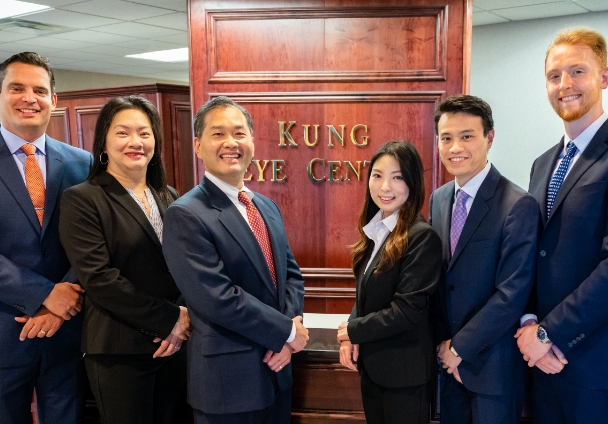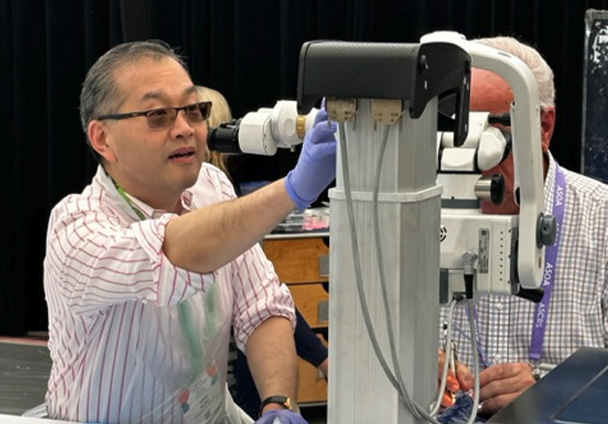- Eye Care Services
- About
- Resources
- For Doctors
- Beyond Eye Care
- Eye Care Services

- About

- Resources

- For Doctors

- Beyond Eye Care

Free LASIK Consultation: Call (855) 875-2020 9:00am–5:00pm

Whether you are experiencing an undiagnosed vision problem or just searching for routine eye care, Kung Eye Center is the answer you are searching for. With our offices in Staten Island, NY, and East Brunswick, NJ, we offer our patients a comprehensive eye exam and top-notch, state-of-the-art care with our experienced and compassionate staff. We are committed to improving the quality of life of our patients through enhanced vision.
Gain a deeper understanding about the topics, conditions, and procedures discussed on this page by watching our informational videos.
Routine eye exams are a crucial part of eye health. Some conditions, such as glaucoma, can begin affecting your vision without you even being aware of it. Thus, it is crucial to get routine eye exams to be able to detect these conditions early, and to intervene. Many systemic conditions, such as diabetes and high blood pressure, can be detected in the eye as well! For many of these patients, their eye doctor is the first person to detect these diseases! Early detection can often make a huge difference when it comes to addressing vision loss early, so it is important to have your eyes routinely examined, even if you can see well. Visual acuity testing during your routine eye exam can determine the state of your eyes, your vision health, and possible vision problems.
In addition to visual acuity, color vision and binocular vision are also assessed to detect color deficiencies and evaluate depth perception and eye muscle coordination. A visual acuity test can help you determine treatment options for your poor vision. It is important to note that a comprehensive eye exam is much more thorough than a basic eye test or vision screening; vision screenings and eye tests are limited and may miss underlying health issues.
At Kung Eye Center, our comprehensive eye exam includes:
If it appears that a more thorough assessment of the interior of the eye is necessary, a dilated exam will be scheduled.
Generally, most adults should have a complete eye exam at least once every 2-3 years, depending on their age, medical history, and family history. Eye doctors are trained to detect early signs of eye disease and develop personalized treatment plans tailored to each patient’s needs. Regular yearly comprehensive eye exams are needed to ensure that you do not have any serious health problems that can affect your vision, such as glaucoma, cataracts, age-related macular degeneration, or diabetic retinopathy.
Seeing the same doctor for each visit can provide continuity of care, allowing for more personalized follow-up and building trust in your ongoing eye health management.
Certain groups of people may be at a higher risk for eye diseases, such as those over the age of 40, who have high blood pressure, who take certain drugs that may affect eyesight, or with diabetes.
Preparing for your comprehensive eye examination is a key step in making sure you get the most out of your visit to the eye doctor. A little preparation can help your eye health professional assess your visual function more thoroughly and address any vision issues you may be experiencing. Here are some helpful tips to ensure your eye exam is as effective and comfortable as possible:
By taking these steps, you’ll help your eye care professionals get a complete picture of your eye health and visual function. Being prepared also ensures that any vision problems or risk factors are addressed promptly, supporting early diagnosis and the best possible treatment plan. Remember, regular comprehensive eye examinations are essential for keeping your eyes healthy and protecting your vision for years to come.
If you would like to schedule an eye exam, please contact our Staten Island or East Brunswick office today. Your eye health and wellness are our main focus! Our friendly and knowledgeable team at Kung Eye will be happy to assist you in any way that we can.
Please call our New York office at (929) 429-2928 or our New Jersey office at (732) 724-2535 with any questions you may have.
STATEN ISLAND, NY EAST BRUNSWICK, NJ
Dr. Kung’s mastery in ophthalmology means you will receive thoroughly informed recommendations for vision correction and maintenance, and that your treatment will be expertly performed for the best possible results.
MEET THE DOCTORS